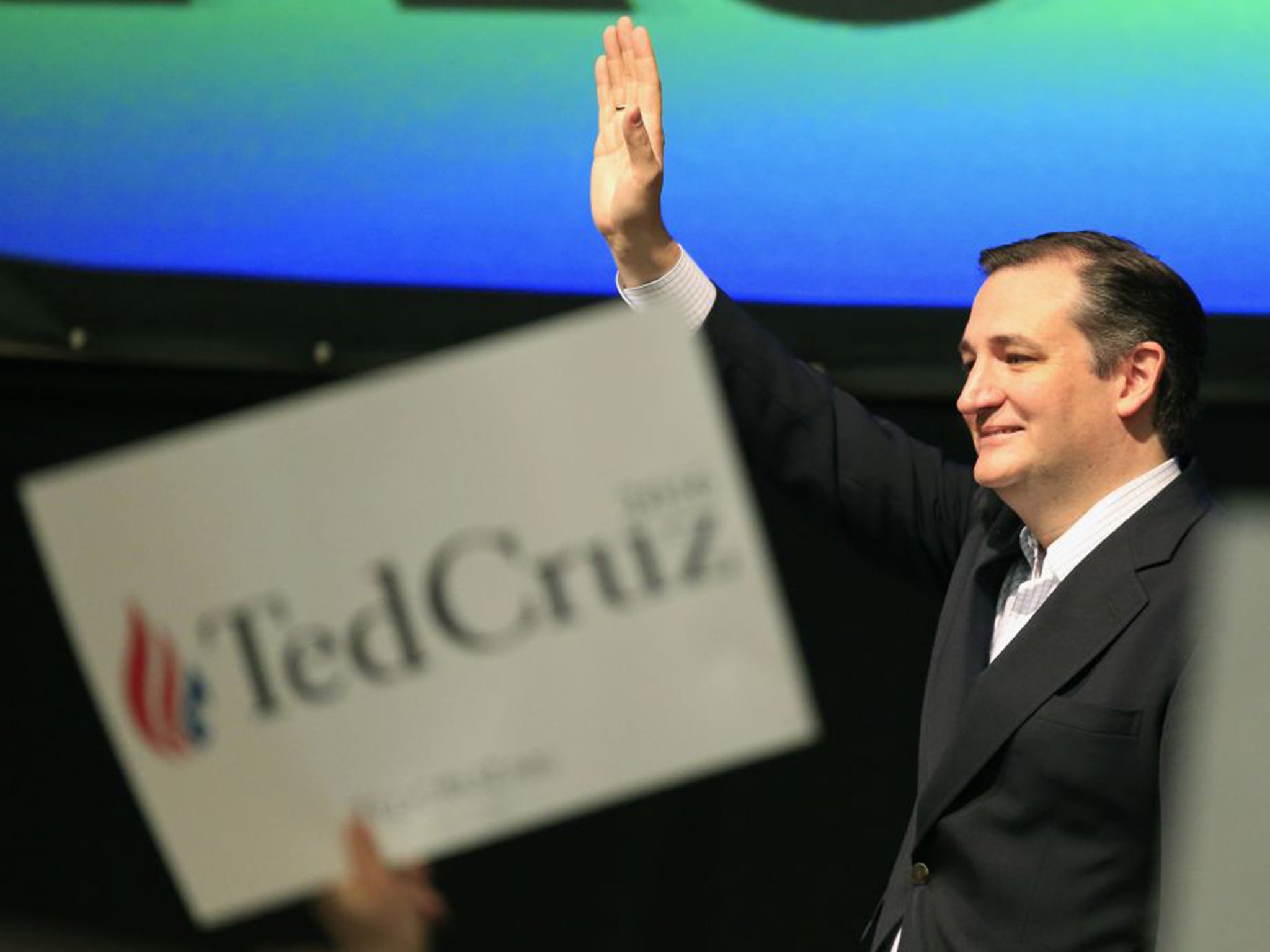US Election 2016: Ted Cruz wins Kansas as presidential hopefuls do battle in five states
Mr Cruz, Donald Trump, Marco Rubio and John Kasich are also competing in Maine, Kentucky and Louisiana

Texas Senator Ted Cruz claimed an easy victory in Kansas and battled with Donald Trump for Kentucky in Saturday's four-state round of Republican voting, fresh evidence that there's no quick end in sight to the fractious race for the Republican presidential nomination. Democrats in three states were choosing between Hillary Clinton and Vermont Senator Bernie Sanders.
Cruz is leading Trump by more than a 2-to-1 margin in partial returns in the Kansas caucuses, and held a narrower lead over the real estate mogul in the Maine caucuses. The Texas senator and Trump are in a tight race in the Kentucky caucuses. Cruz, who enjoys support among evangelicals and the ultraconservative Tea Party movement, attributed his strong showing to conservatives coalescing behind his candidacy, calling it a “manifestation of a real shift in momentum.” He has contrasted his steadfast conservative record to Trump's shifting positions on such issues as abortion and past campaign donations to Democrats, including Clinton.
“God bless Kansas,” Cruz declared during a rally in Idaho, which votes in three days. “The scream you hear, the howl that comes from Washington DC, is utter terror at what we the people are doing together.”
With the Republican race in chaos, establishment figures frantically are looking for any way to derail Trump, perhaps at a contested convention if no candidate can get enough delegates to lock up the nomination in advance. Party leaders - including 2012 nominee Mitt Romney and 2008 nominee Senator John McCain - are fearful a Trump victory would lead to a disastrous November election, with losses up and down the Republican ticket.
“Everyone's trying to figure out how to stop Trump,” the billionaire marveled at an afternoon rally in Orlando, Florida.
In pictures: US Elections 2016
Show all 15Despite the support of many elected officials in Kansas, Florida Senator Marco Rubio came up short, raising serious questions about his viability in the race. Cruz suggested it was time for other Republican candidates to step aside so he could go one-on-one against Trump.
Saturday's Republican races also included a primary election in Louisiana, while Democrats voted in Nebraska, Kansas and Louisiana. With front-runner Trump yet to win states by the margins he will need in order to secure the nomination before the convention, every one of the 155 Republican delegates at stake on Saturday was worth fighting for.
Overall, Trump has prevailed in 10 of 15 state contests heading into Saturday's voting. Cruz had won Alaska, Oklahoma, Iowa and his home state of Texas. Rubio had one win in Minnesota.
Ohio Governor John Kasich also bid for Republican votes. Rubio and Kasich both pinned their hopes on winner-take-all contests on 15 March in their home states.
Cruz will collect at least 17 delegates for winning the Republican caucuses in Kansas, and Trump will win at least six. In the overall race for delegates to the party's national nominating convention, Trump led with 335 and Cruz had 248. Rubio had 110 delegates and Kasich had 25. It takes 1,237 delegates to win the Republican nomination for president.
Although Trump has drawn the biggest crowds at his rallies, Cruz is believed to have an edge in caucus states because he has put an emphasis on organizing a strong ground game to get-out-the-vote.
On the Democratic side, Clinton is farther along than Trump on the march to her party's nomination. She has 1,066 delegates to Sanders' 432, including pledged superdelegates, elected officials and party leaders who can support the candidate of their choice. It takes 2,383 delegates to win the Democratic nomination at the party's national convention. There are 109 at stake on Saturday.
Clinton hoped that strong support among African Americans in Louisiana would propel her to victory. Sanders had higher hopes of making progress in Nebraska and Kansas, where the Democratic electorate is less diverse.
Seeking some traction, Rubio again denounced Trump as a fraud and a “con artist.”
“It's not enough to say, 'Vote for me because I am angrier and over the top and am going to do and say things no one is going to do,”' he told conservatives at the conference outside Washington. At a later rally in Jacksonville, Florida, he pleaded for support from the same city “that believed in me” in his successful Senate bid six years ago.
Trump, intent on denying Rubio a crucial Florida win, had the thousands at his Orlando rally swear to give him their ballots.
With early voting already under way in the state, Trump told them: “Do it now. Do it today. Do it tomorrow.... Remember, you all swore, you're voting for Trump, you can't change.”
Ahead of a debate Sunday night in Flint, Michigan, Clinton met with about 20 African-American ministers in Detroit on Saturday and said “the future” of the Supreme Court was on the ballot in November's general election. The Michigan primary is on Tuesday.
Sanders had events in Ohio on Saturday as the Democrats kept close a watch on those two big states and their upcoming delegate hauls.
AP
Subscribe to Independent Premium to bookmark this article
Want to bookmark your favourite articles and stories to read or reference later? Start your Independent Premium subscription today.

Join our commenting forum
Join thought-provoking conversations, follow other Independent readers and see their replies